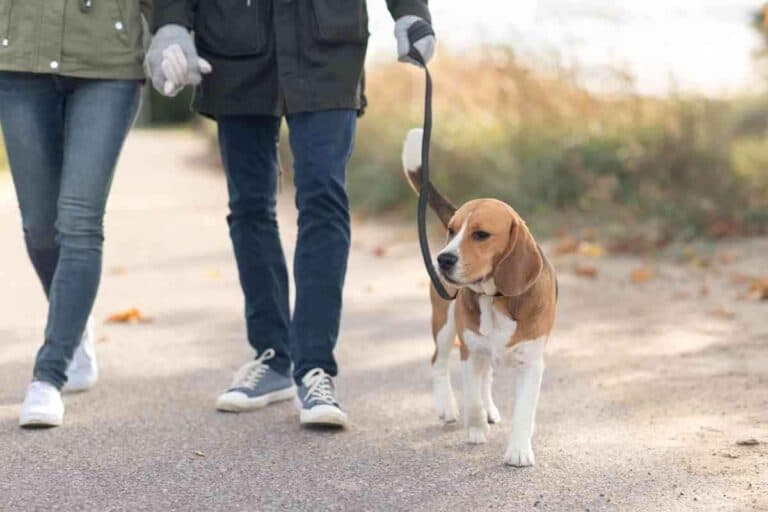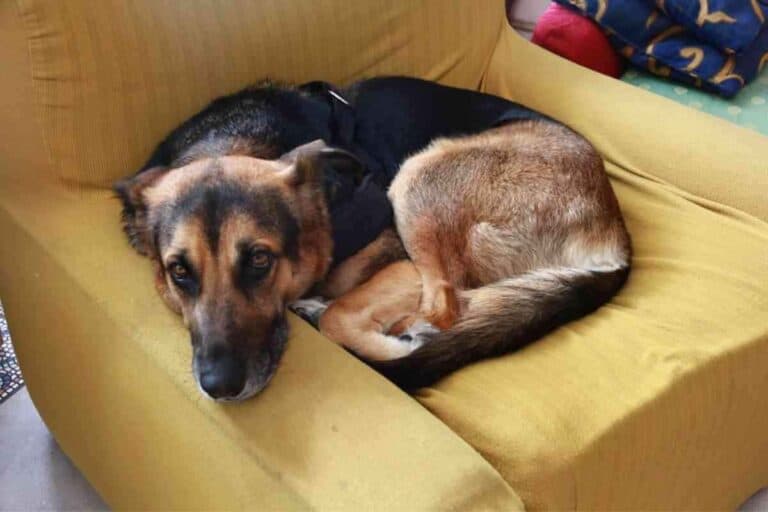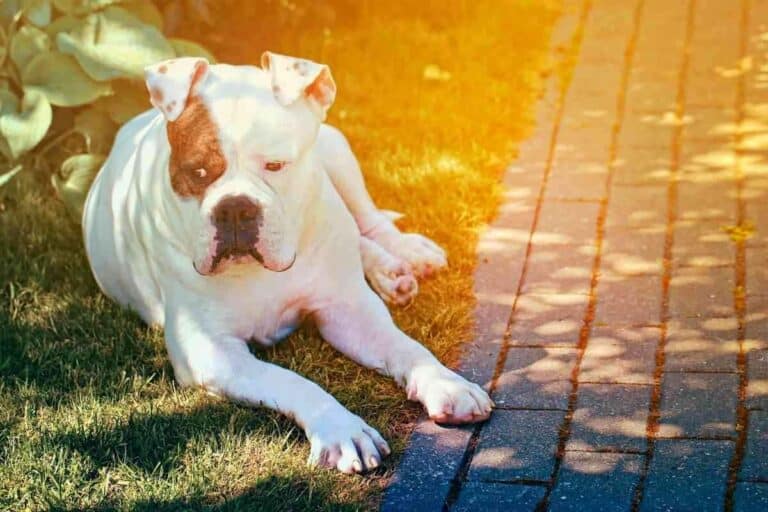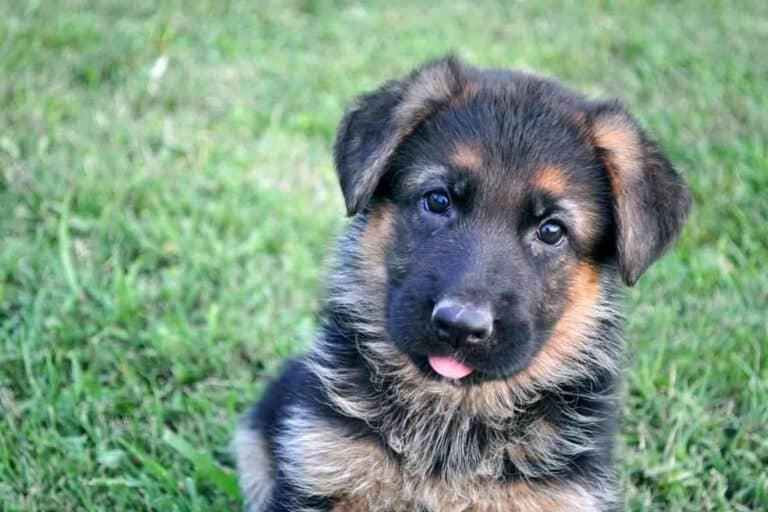How Much Water Should a Labradoodle Puppy Drink?
Most animals need to have adequate hydration to thrive in their life. Without water, an animal will suffer from dehydration and all the problems that come with it. It is super important for your dog, especially your puppy, to be getting enough food and water every day.
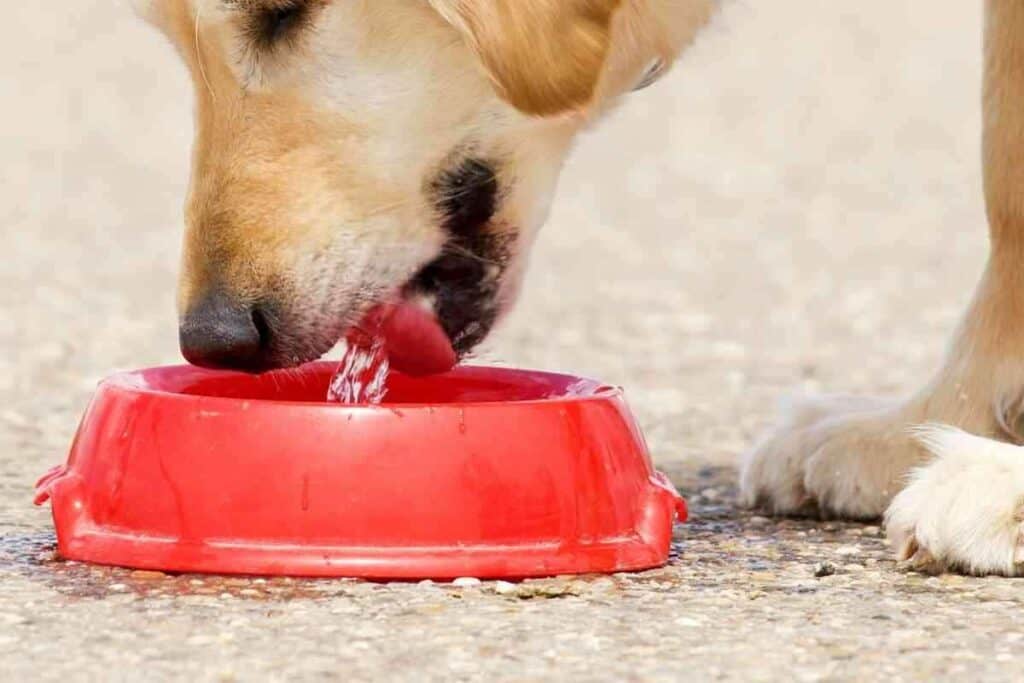
How Much Water Should a Labradoodle Puppy Drink?
The amount of water that your Labradoodle puppy should drink a day is relative to their weight. A dog should drink their weight in ounces, which means that a 5-pound puppy should be drinking 5 ounces. Depending on their age and size, a Labradoodle puppy will need anywhere from 5 to 50 ounces of water a day.
Puppies have much smaller stomachs than adult dogs, so they won’t be able to fit as much water into their bodies at a time. A puppy should have relatively constant access to water in their bowl, but they should be drinking small amounts but frequently.
A larger puppy should drink about half a cup every two hours. This generally provides a good balance between not becoming dehydrated but also not being overhydrated. Both can be a big problem for puppies.
A smaller puppy should be drinking less but even more frequently. Make sure that your Labradoodle puppy is regularly taking sips from their water bowl to ensure that they are getting enough water in its system.
Can A Puppy Be Overhydrated?
As stated above, being overhydrated is just as big of a problem as being dehydrated. Overhydration happens when a dog drinks too much water in a short amount of time. Their body isn’t able to properly absorb the hydration and some of the water can be rejected.
Common problems that a puppy will face if they are overhydrated are having to use the bathroom very frequently or throwing up water in more extreme cases. Both situations are the body’s way of getting rid of the excess water that it can’t use.
With them being still puppies, your Labradoodle’s body will react more harshly to being overhydrated than to an adult’s body. The still-developing body will become damaged from overhydration which can lead to your Labradoodle having a weak bladder and even kidney problems. Overhydration prevents some of the organs from working properly as they become “flooded.”
If you notice that your Labradoodle puppy just won’t stop drinking water, there might be an underlying health problem at play. At that point, you should take your Labradoodle to the vet so that they can figure out what is wrong.
What Happens If My Labradoodle Puppy is Dehydrated?
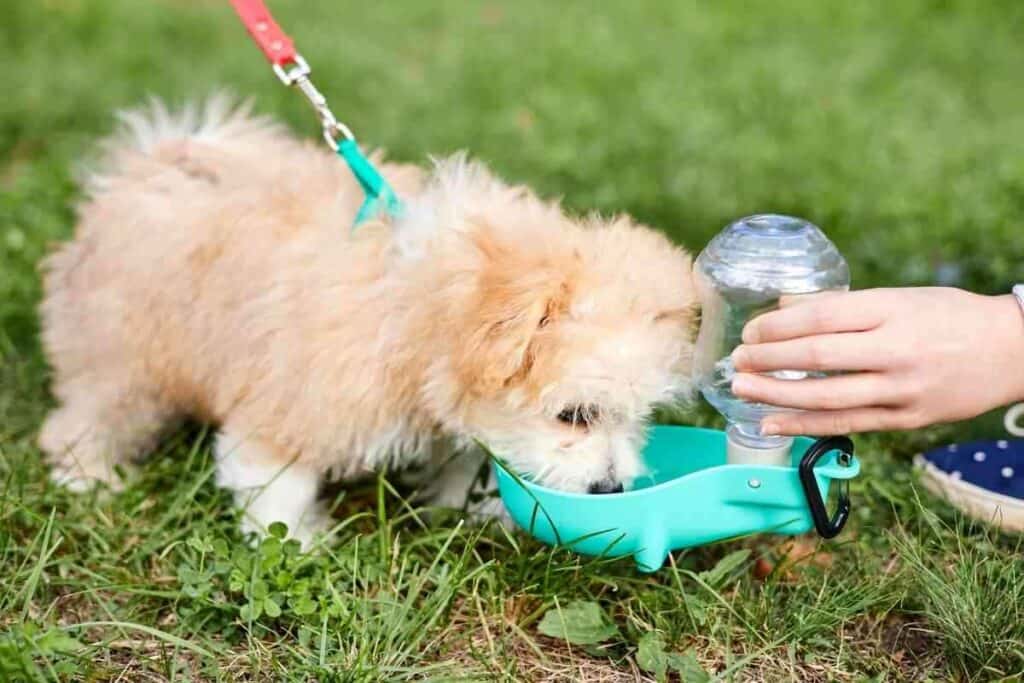
Dehydration is never a fun situation to go through and it severely hurts the health of a puppy. Anything that goes wrong during a dog’s puppy years can impact their growing body and still be a problem later on in life.
When a Labradoodle puppy is dehydrated, it will show many physical signs of this problem. It is super important to catch these symptoms early on so you can correct their water intake before they suffer from long-term damage.
A dehydrated puppy will dry out in a way. Their tongue and nose will become dry to the touch while their skin will become dry and flakey. The damage to their skin will then cause fur to stop growing or to fall out which will be shown through excessive shedding.
Your Labradoodle will become fatigued and lethargic as water is the key to life. It will also like around its mouth frequently or try to lick up any moisture that it can find.
In more severe cases, they will suffer digestive problems such as not being able to keep food in and/or having bathroom problems.
If you see your Labradoodle puppy facing any of the symptoms listed above, you should work to get more water into their system as soon as you can. The younger they are, the more dangerous dehydration is.
My Puppy Doesn’t Want to Drink Water, What Should I Do?
It can be scary when you know that your Labradoodle puppy is dehydrated but it also isn’t drinking the water that is in its bowl. There are a few solutions that you can try to get your puppy to drink more water or at least get more water in their diets through other methods.
Check Their Bowl
If your Labradoodle puppy is refusing to drink their water, make sure that there isn’t a problem with its bowl. Your dog should have a water bowl that is the correct size. A bowl that is too small will be uncomfortable to drink from while a bowl that is too big will be very difficult to drink from.
If your puppy doesn’t like how a metal bowl feels or tastes, try a plastic bowl instead. Sometimes, a dog can have a sensitivity to a type of material, and switching it out is never a bad idea.
Also, make sure that your Labradoodle has clean water in their bowl. No one wants to drink dirty water that has been sitting around for a while. Regularly give your puppy fresh and clean water in their bowl to ensure that there isn’t anything gross in there.
Switch to Wet Food
While this won’t make a huge difference, switching to wet food is a good way to get a bit of extra water in your puppy’s diet. A Labradoodle puppy can start having wet food at 8 weeks old and as the name implies, wet dog food has a higher water content than dry dog food.
Give Your Puppy Foods with High Water Content
By the time your puppy is 8 weeks old, it should be able to eat most of the human foods that a dog can safely eat. There are many kinds of fruit that are safe for dogs from watermelon to strawberries to tomatoes. If your puppy is struggling with staying hydrated, allow them to eat some fruit and vegetables that have high water content. This allows your puppy to eat their hydration and that is better than nothing.
You can also make popsicles with the fruit which can have even more water in them. If your puppy enjoys eating human food from time to time, this can be a good way to get some more water into your dehydrated puppy.
Go to the Vet if There Are Signs of an Underlying Condition
If your puppy is still struggling to become hydrated after these possible solutions, it is time to take your puppy to the vet. There can be an underlying illness, parasite, or other issues that are impacting your Labradoodle’s ability to stay hydrated.
Signs that can indicate an underlying condition include fatigue, pacing, throwing up, unable to keep food down, and any discoloration of their fur, gums, or eyes. It is better to be safe than sorry when it comes to the health of your Labradoodle puppy so don’t be afraid to call up the vet to get a better idea of what is going on with the health of your puppy.
What Are Situations Where My Labradoodle Puppy Will Need More Water?
Puppies tend to be very active creatures and will sometimes need more water depending on their lifestyle. Any puppy that spends plenty of time exercising or being outside when it’s warm out will need to consume more water. This is because a puppy will pant to keep themselves cool and panting evaporates the water in their system. They will need to replenish that water lost by drinking up.
A puppy might also drink more water if they have been put on medication. Some medications have the side effect of making your puppy thirstier so they will want to drink more in a day. As long as they aren’t drinking so much that they make themselves sick, this increase will be okay.
Finally, if your puppy is recovering from an illness, it will want to drink more water. In many kinds of illnesses that puppies face, loss of water through digestive upset is very common. Your puppy will want to replenish that water lost by drinking more in a day.
Final Thoughts
A Labradoodle puppy should drink their weight (taken in pounds) in ounces. The basic rate is for every pound your puppy weighs, it should drink 0.5 to 1 ounce of water. This is the proper balance to keep your puppy properly hydrated, but not overhydrated.
Puppies can face plenty of issues if they are either overhydrated or dehydrated. It is always important to keep an eye on their water habits and their behaviors to make sure they aren’t suffering side effects from improper hydration levels.
If you are ever unsure if your puppy is facing side effects, it doesn’t hurt to get your vet’s opinion.
Labradoodle puppies are super cute and it is important to take proper care of them. From making sure that they get the right amount of water to the proper amount of exercise, taking the best care of them will ensure that they will have a good life.


